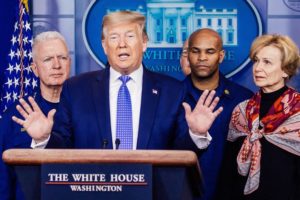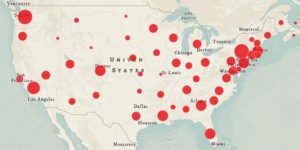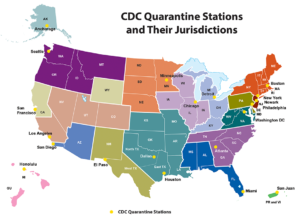Podcast: Play in new window | Download
Update:
- Hosts Discuss Civil Liberties Amid Pandemic
—-
United States Executive Authority Declares Emergency Powers
The last point President Trump’s former attorney Michael Cohen made when he testified last year before Congress was that Trump would never leave office voluntarily. With the pandemic of Covid-19 virus upon us, Trump has the perfect excuse. Last week he declared a state of national emergency. This gives him more than 100 additional powers. He can shut down the Internet, he has already banned gatherings of more than 10 people, and he can send in troops anywhere in the country.
What is the current state of our civil rights and civil liberties?
Guest – Stephen Rohde is a constitutional scholar, lecturer, writer, political activist and retired civil rights lawyer. He is a former President of the ACLU of Southern California and Chair of the ACLU Foundation of Southern California. Mr Rohde has served on the Board of Directors of Death Penalty Focus and was a founder and Chair of Interfaith Communities United for Justice and Peace. He is a past chair of Bend the Arc: a Jewish Partnership for Justice. Mr. Rohde is the author of two books American Words of Freedom: The Words That Define Our Nation and Freedom of Assembly, and co-author of Foundations of Freedom: A Living History of Our Bill of Rights. He has written for American Prospect, Truth Out, Huffington Post, and the LA Times and is a frequent contributor to the Los Angeles Review of Books
—-
United States Executive Authority in Declaring Emergency Powers
U.S. presidents have the discretion to declare a “national emergency.” As soon as he does, he can sidestep many existing limits to presidential authority. In fact, 100 or more special provisions become available to him. Some provide reasonable responses to real emergencies, while others seem to bolster the power of a so-called unitary executive who wants to amassing or retain power. The president can activate laws allowing him to, for example, shut down many kinds of electronic communications inside the U.S. or to freeze Americans’ bank accounts. Other powers are available without a declaration of emergency, including laws that allow the president to deploy troops inside the country to subdue domestic unrest.
The rationale for having emergency powers is simple: The government’s ordinary powers may not be enough in times of crisis, and amending the laws to provide greater ones would take too long. Emergency powers are intended to give a temporary boost until the emergency passes or there is time to change the law through the regular legislative process. The problem comes when presidents don’t have the best interest of the country in mind.
Guest – Andrew Boyd, Counsel in the Brennan Center’s Liberty and National Security Program. Andrew spent 7 years prosecuting senior Khmer Rouge leaders on behalf of the UN for war crimes, crimes against humanity and genocide. He also worked on cases resulting from the 1994 Rwandan genocide at the International Criminal Tribunal for Rwanda.
————————————————
————————————————




